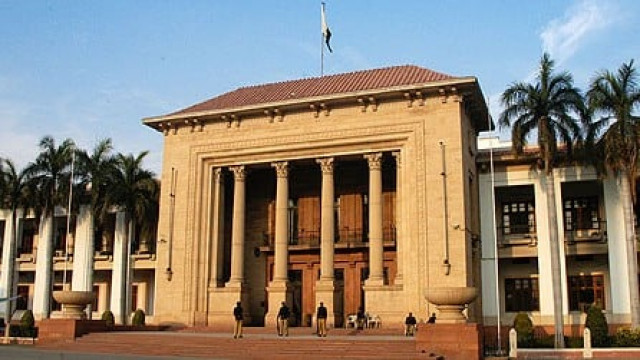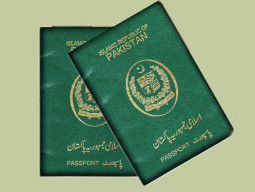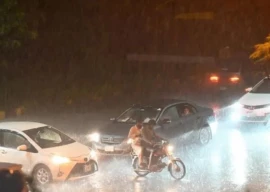
The resolution against ‘objectionable’ concerts at educational institutes that the House adopted on Tuesday remained under discussion on Wednesday.
PML-Q members wanted any amendments to it to be discussed in the House but after a debate the Speaker constituted a three-member committee to draft a new resolution acceptable to all.
The Wednesday session lasted six hours. During the day the House once again passed the 14 bills, which Governor Sardar Latif Khan Khosa had sent back. The members also demanded that the House be briefed daily about the headway been made regarding the Punjab Institute of Cardiology (PIC) incident.
Parliamentary Secretary for Youth Affairs, Sports, Archaeology and Tourism Department Rana Muhammad Arshad answered members’ questions about his department.
Earlier, a Unification Bloc member Sheikh Alauddin, speaking on a point of order, condemned the resolution demanding a ban on objectionable musical concerts in educational institutions. He said that music had a long history and seeking a ban on it was unreasonable. What’s next, asked the member, a ban at schools and colleges on wearing jeans?
At this point, he was interrupted by Speaker Rana Muhammad Iqbal who asked him where he was when the resolution was presented in the House. “You should have opposed it then,” he said and then asked Law Minister Rana Sanaullah to respond to Alauddin’s comments.
Sanaullah said that he had opposed the resolution. “It was at my objection that the word ‘objectionable’ was added,” he said, adding that the members had passed a resolution opposing ‘vulgar and objectionable’ music concerts in education institutions.
“Also, a resolution is not a law, he said. “All the members who were present in the House [on Tuesday] endorsed the resolution,” said the law minister.
PML-Q Parliamentary Leader Chaudhry Zaheeruddin Khan then said that he agreed with Sanaullah about banning “vulgar and objectionable” music concerts and suggested that a new resolution be moved.
Leader of Opposition Raja Riaz – who while talking to reporters ahead of the session, had vowed that the PPP would move a resolution condemning the Tuesday resolution – also lent his support to Sanaullah and Zaheeruddin. “A new resolution should be tabled but objectionable and vulgar music concerts should not be allowed,” he said.
Alauddin protested at this point and demanded that the House either withdraw the Tuesday resolution or bring a new resolution excluding the word objectionable. “If the new resolution has the word ‘objectionable’ then it will mean that the principal of that institution would be required to seek permission from the Culture Department before every concert,” he said. That, Alauddin said, was unacceptable. “Music is part of Punjab’s culture. It should not be banned through a resolution,” the Unification Bloc member said.
However, most members said that they would not allow ‘objectionable’ and ‘vulgar’ concerts in educational institutions. The Speaker then constituted a committee comprising Chaudhry Zaheeruddin, Shaukat Basra and Rana Sanaullah to table a new resolution.
PPP staged a walkout after Raja Riaz was not allowed to debate the issue in detail but the members returned shortly after.
PIC tragedy
Raja Riaz demanded that Chief Minister Shahbaz Sharif resign since he had the charge of the Health Department. “Sharif should come to the House and apprise the members about what steps the Punjab government is taking to stop any more casualties,” he said. Riaz asked the Speaker to summon the chief minister through an ad in the press. However, members later agreed that the parliamentary health secretary should brief the House daily.
Bills
The treasury benches managed to re-pass the 14 bills the governor had returned after the previous session.
The opposition tried to thwart the passage by raising objections and pointing out quorum five times.
First it said that the treasury could not move the bills as ‘motions’. Rules demanded that the bills once again be sent to the standing committees concerned before being presented in the House, it said.
Sanaullah said that procedure was supposed to be followed when new bills were presented. These bills, he said, had already been passed and therefore required only a motion in order to be re-passed.
The opposition then asked the treasury benches not to pass the bills until the parliamentary implementation commission had notified new devolution of power arrangements. To this, Sanaullah said that after the 18th amendment, all departments under the concurrent lists stood devolved. It was now the responsibility of provincial governments to legislate, he said.
(Read: Wasted youth)
Published in The Express Tribune, January 26th, 2012.


















COMMENTS
Comments are moderated and generally will be posted if they are on-topic and not abusive.
For more information, please see our Comments FAQ